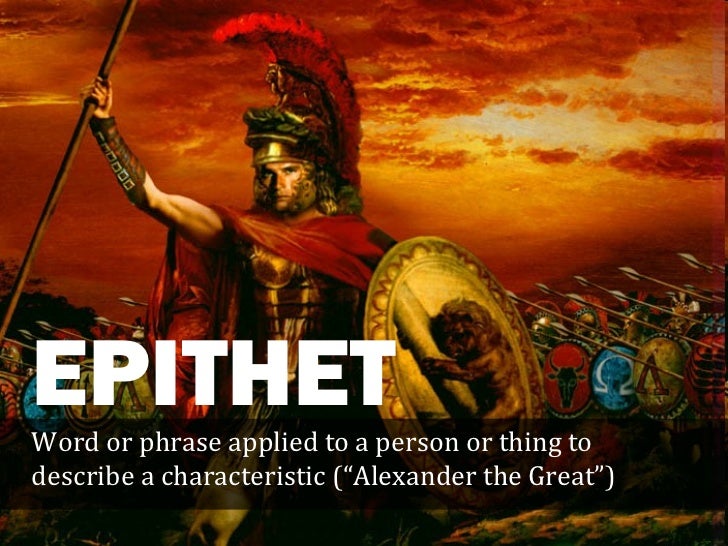 Today I am speaking of epithets. Years ago I had thought it a word synonymous with 'insult'. In fact, you read in books of people 'hurling epithets'. But the definition is a short nickname, often using an adjective or descriptive phrase, which is attached to the person's name. (Read on regarding the insult issue)
Today I am speaking of epithets. Years ago I had thought it a word synonymous with 'insult'. In fact, you read in books of people 'hurling epithets'. But the definition is a short nickname, often using an adjective or descriptive phrase, which is attached to the person's name. (Read on regarding the insult issue)
Epithet is defined as a short, poetic nickname--often in the form of an adjective or adjectival phrase--attached to the normal name. (Richard the Lionheart or Duke John the Good.)
You will often see this in poetry when the poet needs a few more syllables to make his lines scan properly. Let's say he is short four syllables while writing about one or another of the Erics that you might encounter while dealing with Vikings. Eric wore glasses (obviously a warrior ahead of his time) so the poet could tack on 'The Short-Sighted' and fill the necessary syllables.
You will often see this in poetry when the poet needs a few more syllables to make his lines scan properly. Let's say he is short four syllables while writing about one or another of the Erics that you might encounter while dealing with Vikings. Eric wore glasses (obviously a warrior ahead of his time) so the poet could tack on 'The Short-Sighted' and fill the necessary syllables.
 |
| Hector |
The Homeric Epithet (found, not surprisingly, in Homer) has Fleet-Footed Achilles, Menelaus of the Loud War-Cry, Hektor of the Glancing Helmet, Sneaky-Minded Odysseus. (Some of these names may be my own invention...)
The use of the epithet comes into its own with heads of state. We have Edward Longshanks (Edward I of England) who was, himself, the son of John Lackland (John I, Richard the Lionheart's youngest brother).
In history we have Ethelred the Unready, Berthe aux Grands Pieds (Big-foot Bertha), Pepin the Short, Louis (XIV) the Sun-King, The Grandmother of Europe (Queen Victoria). My favorite of all of them, however, is the nickname for the Prince Regent, the man who became George IV: "The Prince of Whales".
Wikipedia has a fascinating listing of epithets applied to rulers Here.
It is worth a visit.
Click here to Go to the A to Z Challenge


(Team Sunrise Service! hehe) I'd heard of the word and seen the examples without knowing what they were called. Now I know they're connected. :)
ReplyDeleteI had to sit down and think of the connection between insult and the other, but then I remembered that 'Diana the Terminally Late' could be deemed an insult. It got me laughing.
DeleteAwesome post, Diana! I think we all should have epithets (so much better than a plain,old last name).
ReplyDeleteLove,
Cherdo the Geezer
....there is always 'Cherdo the Side-Splitter', as well. (Makes the serious and thoughtful posts a little more impressive, when they come!
DeleteHi Diana .. some great examples here .. and yes I guess I could conjure up a few of my own ... Asterix springs to mind ...
ReplyDeleteYes the Prince of Whales .. he certainly was ... cheers Hilary
Thank you, Hilary! With your broad knowledge, I imagine you could scatter epithets (the good kind) lavishly.
DeleteHow interesting. Every time I stop by, I learn something.
ReplyDeleteThanks, Diana the Informer.
Why, thank you Beth the Balladeer!
DeleteFascinating. I've always thought Lion the Lionheart was a great epithet!
ReplyDeleteI imagine that if Richard Heard it (and followers of a powerful man tend to be flattering) he was delighted. And perhaps a bit of the swelled head...?
Delete